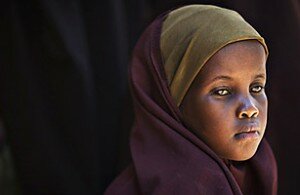Why the World Cares More About Somalia’s Pirates Than its People

A Somali refugee girl waits to be registered by the United Nations High Commission of Refugees at Dagahaley camp in Dadaab in Kenya's northeastern province
TIME — A warning this week from the British aid group Oxfam that the humanitarian crisis in Somalia is the worst in Africa is not new. Last year, the U.N. called the situation in the Horn of Africa nation the world’s worst. But Oxfam’s is a much needed reminder of the scale of the catastrophe. One million Somalis are refugees. Two million need food. For most of these, malnutrition rates are beyond the U.N. threshold definition of an emergency. Around 400,000 refugees are in a single sprawling camp at Afgooye outside Mogadishu; 70,000 have arrived in the last month after fleeing the latest round of fighting in the capital. A further 275,000 have fled south to Kenya and live in three camps at Dadaab in the north of the country originally meant for 90,000; the U.N. High Commission for Refugees says 7,000 more Somalis also arrive there each month.
Hassan Noor, Oxfam’s Humanitarian Coordinator for Somalia, says: “War, drought and malnutrition are thrusting Somalia towards even greater catastrophe. Living conditions in Afgooye are some of the worst I have ever seen. I couldn’t see a single shelter fit for human beings, and thousands of people have nothing to sleep under or protect them from the searing heat and heavy rains. I saw sick children lying on the floor with diarrhea and disease. I saw a young girl who had been shot in the head, fleeing with her family. People told me they expect the situation to get even worse in the next few weeks.” (See pictures of the pirates of Somalia.)
That sounds like a situation in which to invoke the international responsibility to protect. Adopted at a U.N. World Summit in 2005, “R2P” sets out in law the reasons and duty for international intervention: if a nation commits, or is unable to prevent, massive human-rights abuses on its soil. Other, lesser African disasters do qualify for R2P intervention, in the form of large peacekeeping forces. The U.N. has authorized 26,000 troops for Darfur, where massacres are common and 2.5 million people need aid (and mostly receive it). It has also authorized another 20,000 for the Democratic Republic of Congo, where human-rights abuses are rife and millions are intermittently made refugees.
Somalia would seem to be another case in point. After 18 years of war between rival clans, warlords and Islamists, the latest round in this Byzantine bloodbath pitches the Islamist government against marginally more extreme Islamist rebels to whom it was allied until last year. Not that the terms government and rebel really apply to Somalia. Both groups control little more than a few blocks of Mogadishu and a handful of small towns, and neither has much function — or often, it seems, ambition — aside from fighting the other. (Read: “In Somalia, Another Government Teetering?”)
Meanwhile, the country exists in a violent and anarchic vacuum, a place that has gone 18 years without a government, which is an al-Qaeda sanctuary and destination of choice for hundreds of foreign jihadists, and where millions need food but where 40 aid workers have been killed since the start of 2008. Somali expert Ken Menkhaus, political science professor at Davidson College, calls it the “longest-running instance of complete state collapse in the post-colonial era.”
And what does Somalia receive? Around 4,800 African Union troops from Burundi and Uganda. Last month, the British ambassador to the U.N. assured reporters in the capital of neighboring Ethiopia that although U.N. Secretary-General Ban Ki-Moon has so far demurred on Somalia, “the question of a United Nations peacekeeping mission remains on the table.”
Of course, there is a situation in Somalia that has attracted global military intervention, even without the U.N: piracy. Australia, Bahrain, Britain, Canada, China, Denmark, France, Germany, India, Iran, Italy, Japan, Jordan, the Netherlands, Pakistan, Portugal, Russia, the Seychelles, Spain, Singapore, South Korea, Spain, Sweden, Turkey, the U.S. and Yemen have all contributed to the effort to safeguard international sea trade. Currently that involves 25 warships, scores of surveillance planes and tens of thousands of sailors. (See pictures of Somali piracy.)
It’s stating the obvious to say the Somali crisis that involves millions of people receives almost no attention while the Somali crisis that involves millions of dollars receives unprecedented military action. (Menkhaus says the pirates raised $20-$40 million in ransoms last year. They also cost the shipping industry millions more in hiked insurance premiums.) It’s also true that land intervention in Somalia would be immeasurably bloodier than the sea operations underway and the ineffectiveness of peacekeepers in Darfur and the DRC raises big questions over whether such operations can ever be successful. And it is widely acknowledged that finding a lasting fix to either piracy or the humanitarian crisis would require fixing Somalia and that, as President Sheikh Sharif Sharif Ahmed told the Guardian newspaper last month, “is the hardest job in the world.”
But none of that makes any more palatable — or defensible in international law — the idea that the world’s worst humanitarian disaster continues to unfold within sight of its most international military force. “Somehow the rights of ordinary Somalis seem not to count in the international system,” says Alex de Waal, program director at the Social Science Research Council in New York. “The Somali issue is framed entirely in terms of other political agendas.”
Comments
comments
 Calendar
Calendar






































